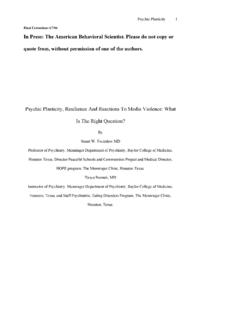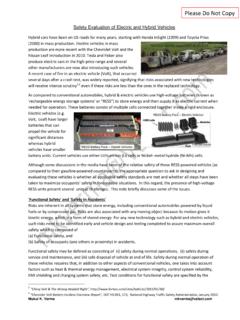Transcription of Draft, Please Do Not Copy without Explicit Permission from ...
1 1 Draft, Please Do Not copy without Explicit Permission from Author NATO s Paradigm Shift: Searching for a Traditional Security-Human Security Nexus By: Isaac Kfir* Abstract: The paper explores what should NATO s agenda in the post-Afghanistan period, suggesting that to remain relevant the alliance has to develop a new identity that is human security in orientation. Reviewing the Military Concept against Terrorism (MDCAT), the Chicago & Wales Summits and the EU s Common Defense and Security Policy (CDSP) two propositions are offered. First, that the vacillating commitment of the members who either chose to address security issues through EU security mechanisms or form a coalition of the willing, threatens NATO s relevance.
2 Second, that by developing MDCAT and Smart Defense along a more human security framework coupled with NATO s maritime operations, the Alliance would satisfy the needs of its European members allowing them to employ NATO as a way to support CDSP and in doing so ensure a continued reliance on NATO. * Isaac Kfir is a Visiting Assistant Professor of International Relations and Law at Syracuse University where he currently teaches International Human Rights Law, Post-Conflict Reconstruction and the Rule of Law, and International Security. He is a Research Associate at the Institute for National Security and Counterterrorism (INSCT), Syracuse University.
3 Isaac received his in International Relations from the London School of Economics (1999) and holds a Post-Graduate Diploma in Law (PGDL) and Bar Vocational Certificate (BVC) from BPP Law School (2001). He was also a member of Inner Temple. 2 Draft, Please Do Not copy without Explicit Permission from Author The North Atlantic Treaty Organization (NATO) was formed on April 4, 1949, as a defensive alliance, design to deter Soviet expansionism and other external threats1 through the threat to use or actual use of Additionally, NATO also sought to promote neoliberal democratic ideals.
4 In the post-Cold War period, as the raison d' tre for NATO s existence disappeared, ethno-nationalist, genocidal conflicts broke out in the Balkans, posing a direct risk to the European members. These conflicts offered NATO the opportunity to adopt a new identity: a second-generation peacekeeping actor within the Euro-Atlantic zone3 and remain an important player in international relations. Thus, NATO managed key operations in the Balkans and helped administer peace, stabilization and reconstruction. Of late however NATO seems to be grappling with an identity crisis, one that has been intensified by the drawing down of international forces in Afghanistan, limited or no intervention in crises in Libya, Syria, and the Ukraine, raising the prospect of irrelevancy especially when one considers the strategic pivot,4 attempts by Europeans to reignite enthusiasm for integration through a common defense, security and foreign policy,5 and a growing demand for defense spending cuts.
5 Which already affects NATO s notion of collective security infuses two key meanings: an idealized, Kantian-Wilsonian inspired international order seeking and promoting neoliberal democratic values;7 and, a collective security alliance based on the League of Nations experience that combines shared values with positive security In focusing on traditional security, NATO recognizes that war is always possible and that the use of force has 1 The Preamble to the Washington Treaty notes that the shared values are democracy, individual liberty and the rule of law in addition to a desire to live in peace with all peoples and governments.
6 The North Atlantic Treaty, April 4, 1949. Additionally and more specifically, Article 5 declares, The Parties agree that an armed attack against one or more of them in Europe or North America shall be considered an attack against them all and consequently they agree that, if such an armed attack occurs, each of them, in exercise of the right of individual or collective self-defence recognised by Article 51 of the Charter of the United Nations, will assist the Party or Parties so attacked by taking forthwith, individually and in concert with the other Parties, such action as it deems necessary.
7 Including the use of armed force, to restore and maintain the security of the North Atlantic area. The North Atlantic Treaty, April 4, 1949. 2 In its 1950 Strategic Concept, the Alliance declared that its objectives are: coordinate in times of peace the military and economic strength of the members as a way to deter threats to peace and to ensure that it can respond to threats. The Strategic Concept for the Defense of the North Atlantic Area , (DC 6/1), dated January 6, 1950. 3 Even though technically Bosnia and Kosovo were out-of-area operations, because they were in territorial Europe, the NATO members could make the case that they were operating within their zone a claim that cannot be made in relation to NATO s role in Iraq and Afghanistan.
8 4 Hillary Clinton, America s Pacific Century , Foreign Policy, November 2011, ; Nick Bisley and Andrew Phillips, Rebalance To Where?: US Strategic Geography in Asia , Survival, Vol. 55, No. 5 (2013), pp. 95-114. 5 Anand Menon correctly notes that the fundamental objective of the Lisbon Treaty was to make the European Union a more effective global actor. Anand Menon, European Defence Policy from Lisbon to Libya , Survival, Vol. 53, No. 3, (2011), p. 75. 6 Sven Biscop, The UK and European Defense: Leading or Leaving , International Affairs, Vol.
9 88, No. 6 (2012), pp. 1297-1313; Ellen Hallams and Benjamin Scheer, Towards a Post-American Alliance? NATO Burden-Sharing after Libya , International Affairs, Vol. 88, No. 2 (2012), pp. 313-27. 7 The preamble to the North Atlantic Treaty declares that NATO is founded on democratic principles, which requires members to be democratic. NATO has adopted a host of programs such as Partnership for Peace designed to promote democratic values. 8 David S. Yost, The New NATO and Collective Security , Survival, Vol. 40, No. 2 (1998), pp. 135-60. 3 Draft, Please Do Not copy without Explicit Permission from Author wide-ranging effects, which is why NATO served as a deterrence actor, especially during the Cold At the same time, it also identified that by promoting and preserving individual rights, through interaction with state actors, it could prevent conflict and protect the NATO The events of 9/11 ushered in a new period for NATO.
10 As the threat posed by al-Qaeda called for a multifaceted approach to security that oscillated between upholding a traditional security policy (protecting the territorial sovereignty of the member states) and addressing the causes that lead to the rise of nihilist, transnational terrorist groups. Accordingly, NATO s security identity concentrated on two multifaceted themes: a security program for the Euro-Atlantic zone that focused on anti-terrorism and internal security (security for the homelands that is technical in nature and orientation) and counter-terrorism, liberal peace-driven, nation-building program understood as liberal peacebuilding,11 as a means to attain external In 2014, NATO as it places the Afghan experience behind it, faces new questions on whether the alliance needs a new agenda not to mention an identity so that it could remain relevant in international The challenges stem in part from the evolution of threats from non-traditional security14 or unforeseeable crises such as natural disasters, large populations.











